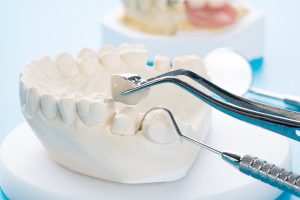A dental crown is a strong, custom-made cap that restores a tooth’s function and appearance after damage, decay, or a root canal. While the procedure is routine, patients often wonder how long the numbing sensation will last afterward. If you’ve recently had a crown placed, you may also experience mild tooth sensitivity after a crown, which is normal and usually temporary.
In this guide, we’ll explain the numbing process, how long it lasts, and provide helpful tips to manage discomfort as your mouth adjusts to the dental crown.
Understanding the Dental Crown Procedure
In most cases, the dental crown procedure requires two appointments. During the first visit, your dentist will:
- Evaluate the tooth to determine if it’s strong enough for a crown.
- File it down or build it up so it’s the ideal size.
- Take an impression and send it to a lab to create your custom dental crown.
- Place a temporary crown to protect your tooth while the permanent one is being made.
At your second appointment, your dentist will remove the temporary dental crown and secure the permanent one using a strong adhesive. Patients receive local anesthesia to ensure a comfortable, pain-free experience during both visits.

How Long Will the Dental Numbing Last?
Most patients feel numb for a few hours after a dental crown is placed. The duration depends on several factors, including:
- The amount of anesthesia used during the procedure.
- Whether you had an infection before treatment.
- Your overall health and how quickly your body metabolizes anesthesia.
Typically, the numbing sensation fades within three to five hours, though it may take longer for some people.
Managing Numbness and Discomfort After a Dental Crown
1. Massage Your Face and Mouth
Gently massaging your lips, cheeks, and jaw can increase blood flow and help the anesthesia wear off more quickly. Make sure to wash your hands thoroughly before touching your face.
2. Get Moving
Light physical activity, such as walking or stretching, can help your body metabolize the anesthesia more efficiently. If your dentist has cleared you for exercise, gentle movement may speed up the process.
3. Keep Yourself Distracted
If you focus on the numbness, you’re more likely to notice and be bothered by it. Engage in tasks that keep your mind occupied, such as reading, working, or socializing.
4. Be Patient
It’s natural to feel impatient while waiting for normal sensation to return. However, the numbness will fade soon—giving it time is the best solution.
5. Avoid Chewing on the Numb Side
Chewing while numb can lead to accidental bites or burns, especially when consuming hot foods or beverages. Stick to soft foods and chew on the unaffected side of your mouth.
6. Swish with Warm Salt Water
A gentle saltwater rinse can help soothe your gums and promote healing after a dental crown procedure. Mix a teaspoon of salt into warm water and swish gently before spitting it out.
What to Expect After a Dental Crown
As your mouth adjusts to the new dental crown, you may notice mild discomfort or sensitivity after a dental crown. This is normal and usually subsides within a few days.
Common concerns after a dental crown include:
- Temporary sensitivity to hot or cold foods.
- Mild soreness around the gumline.
- A slight change in bite as your mouth adjusts.
Most of these symptoms resolve within a week. However, if toothache after a crown persists or worsens, it may indicate an issue that needs attention, such as an improper fit or an underlying infection.

FAQs About Dental Crowns
Do dental crowns hurt?
The procedure itself is painless thanks to anesthesia. Some patients experience mild temporary dental crown pain or tooth sensitivity after a crown, but this usually fades quickly.
How long do dental crowns last?
With proper crown dental care, most dental crowns last between 10 to 15 years—sometimes longer! Regular checkups and good oral hygiene help extend their lifespan.
How to care for a dental crown?
To keep your dental crown in great shape:
- Brush and floss daily.
- Avoid biting down on hard foods like ice or candy.
- Wear a nightguard if you grind your teeth.
- Visit your dentist regularly for checkups.
Why does my tooth hurt after a crown?
If your tooth hurts after a crown, it could be due to temporary irritation, an adjustment period, or an issue with the fit. If discomfort persists, contact your dentist.
Schedule an Appointment at Moore Family Dentistry
If you have concerns about dental crown aftercare, numbness, or pain after a dental crown, we’re here to help. At Moore Family Dentistry, we prioritize your comfort and care at every step. Contact us today to schedule an appointment!
